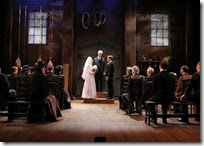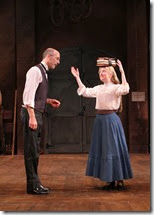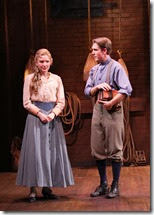There oughta be a law: every 10 years, theatergoers/lovers should be required to attend a production of Thornton Wilder's ground-breaking Pulitzer Prize-winning drama, Our Town. Why? Well, at each performance, because of the passage of time, we see the events unfolding onstage through a new lens of experience, making its themes reverberate differently for us at various stages in our lives.
That is exactly what happened to me at Tuesday night's performance of the Shakespeare Theatre of New Jersey's emotionally satisfying production of Our Town. I saw the play in 1996 and later in 2001, yet, I was totally unprepared for the profound effect the play's simplicity and honesty had on me. Despite the oddity (for us) of its scenes of rural life and eschewal of colorful language, Our Town resonates anew to show that Wilder still has something important to say.
A chronicle of small-town life at the turn of the century, this classic of the American theater is alternately wistful, funny, somber and tragic—sometimes all at once! As the audience follows two families through important life cycle events, the play becomes a testament to life’s simple pleasures, quiet joys and sorrows.
 A bare stage ("Scenery is for those who think they have to have scenery"), furnished with two tables and some chairs, encourages the audience to use their imaginations to flesh out the suggestions provided by a character called the Stage Manager as he guides us through three separate days occurring over a period of 13 years in Grover’s Corners, New Hampshire (pop. 2,642). But the simplicity is deceptive: Absent an elaborate set, costumes or props, Wilder forces the audience to focus on the actors’ words and actions. Beginning with the birth of twins down in Polish Town and ending with a death in childbirth, the action revolves around the lives of the members of two neighboring clans, especially the parents and eldest children.
A bare stage ("Scenery is for those who think they have to have scenery"), furnished with two tables and some chairs, encourages the audience to use their imaginations to flesh out the suggestions provided by a character called the Stage Manager as he guides us through three separate days occurring over a period of 13 years in Grover’s Corners, New Hampshire (pop. 2,642). But the simplicity is deceptive: Absent an elaborate set, costumes or props, Wilder forces the audience to focus on the actors’ words and actions. Beginning with the birth of twins down in Polish Town and ending with a death in childbirth, the action revolves around the lives of the members of two neighboring clans, especially the parents and eldest children.
 Veteran Director Joe Discher doesn't monkey with Wilder's script, sticking close to the stage directions, yet keeping the action moving along at a steady clip; he opts for earnestness without sentimentality. As the Stage Manager, one of Wilder’s innovative ideas, Philip Goodwin (left) provides on-stage guidance, admonishing a professor (a very funny and officious Glenn Beatty) who drones on about Grover’s Corners' geological and anthropological antecedents; he also gives us “inside” information (present and future) about some of the characters—major and minor—we couldn’t get elsewhere. Marion Adler (Mrs. Gibbs) and Allison Daugherty (Mrs. Webb) bustle busily about their respective kitchens, convincingly miming the preparation of breakfast for their children and spouses, and stealing a few minutes while shelling peas to share their dreams of travel and their anxiety for the well-being of their families. They project an air of motherly concern, stability and girlishness.
Veteran Director Joe Discher doesn't monkey with Wilder's script, sticking close to the stage directions, yet keeping the action moving along at a steady clip; he opts for earnestness without sentimentality. As the Stage Manager, one of Wilder’s innovative ideas, Philip Goodwin (left) provides on-stage guidance, admonishing a professor (a very funny and officious Glenn Beatty) who drones on about Grover’s Corners' geological and anthropological antecedents; he also gives us “inside” information (present and future) about some of the characters—major and minor—we couldn’t get elsewhere. Marion Adler (Mrs. Gibbs) and Allison Daugherty (Mrs. Webb) bustle busily about their respective kitchens, convincingly miming the preparation of breakfast for their children and spouses, and stealing a few minutes while shelling peas to share their dreams of travel and their anxiety for the well-being of their families. They project an air of motherly concern, stability and girlishness.
 Malachy Cleary as Doc Gibbs is a kindly, firm and wily paterfamilias, especially when he shames his son George by pointing out that his mother has had to chop wood while he has been out playing baseball. The scene with his wife, wherein he confesses to his own wedding day terror that they’d run out of things to talk about, is charming. As Mr. Webb, forthright editor of the local newspaper, James Michael Reilly (right, with Nisi Sturgis) affectionately gives voice to one of the play’s themes when he comments early on that while there may not be much culture in the hamlet, folks take pleasure in small joys, such as sunrises over the mountain, the birds and the change of seasons.
Malachy Cleary as Doc Gibbs is a kindly, firm and wily paterfamilias, especially when he shames his son George by pointing out that his mother has had to chop wood while he has been out playing baseball. The scene with his wife, wherein he confesses to his own wedding day terror that they’d run out of things to talk about, is charming. As Mr. Webb, forthright editor of the local newspaper, James Michael Reilly (right, with Nisi Sturgis) affectionately gives voice to one of the play’s themes when he comments early on that while there may not be much culture in the hamlet, folks take pleasure in small joys, such as sunrises over the mountain, the birds and the change of seasons.
 Jordan Coughtry (left, with Nisi Sturgis as Emily) is appropriately goofy yet achingly earnest as teenage George Gibbs, star baseball player and would-be Romeo. In the difficult transformation of Emily Webb from smug teenager to sorrowful ghost, a luminous Nisi Sturgis masterfully displays the smugness of a bright, pretty girl masking a latent interest in the opposite sex and the touching terror of the bride on her wedding day. Coughtry is achingly earnest in his scene with Sturgis, where he attempts to tell Emily how he feels about her and their future together, and the scene in the soda shop when the two discover their feelings for each other is both droll and moving. That the two are real-life spouses makes their chemistry all the more delicious.
Jordan Coughtry (left, with Nisi Sturgis as Emily) is appropriately goofy yet achingly earnest as teenage George Gibbs, star baseball player and would-be Romeo. In the difficult transformation of Emily Webb from smug teenager to sorrowful ghost, a luminous Nisi Sturgis masterfully displays the smugness of a bright, pretty girl masking a latent interest in the opposite sex and the touching terror of the bride on her wedding day. Coughtry is achingly earnest in his scene with Sturgis, where he attempts to tell Emily how he feels about her and their future together, and the scene in the soda shop when the two discover their feelings for each other is both droll and moving. That the two are real-life spouses makes their chemistry all the more delicious.
Charlie Calvert has designed a set to look like a theater's bare stage (complete with ghost light and a pair of door for bringing in large pieces of scenery), which Matthew Adelson has lit atmospherically. Discher's sound enhances the rural setting alluded to in the play, and Candida Nichols' costumes are appropriate to time and place. Dressing Sturgis in white in the final act draws our attention to her character in a sea of black mourning clothes. Diego Daniel Pardo has effectively coached the actors to speak in (and maintain) credible New England accents.
With its simple pleasures, unsophisticated language and focus on birth, marriage and death, Our Town at first might seem to be a bit corny. What does a play written in 1938—about a small town at the turn of the century, peopled by rather unremarkable folks—have to say to us in the second decade of the 21st century? In an increasingly complex technological world where it’s all too easy to be sucked into the rat-race of career, money and status, Wilder reminds us to take time to look at one another, to notice “clocks ticking, sunflowers, food and coffee, and new-ironed dresses and hot baths...and sleeping and waking up,” lest we learn too late, as Emily says, “Oh, earth, you’re too wonderful for anybody to realize you.”
In his introduction to the 75th anniversary edition of Our Town, playwright Donald Margulies called it "the great American play," a judgment with which the edgy Edward Albee concurred. Thank you to the Shakespeare Theatre of New Jersey for a wonderful gift that reminds us of “a wonderful congenial homeliness” that is Our Town. So call a relative, a teenager, a friend and make a date to fulfill your assignment to see Our Town. Don't wait for another 10 years to pass before doing so.
Our Town will be performed at the F.M. Kirby Shakespeare Theatre, 36 Madison Avenue, Madison, through November 17. For performance times and tickets, call the box office at 973.408.5600 or visit online at www.ShakespeareNJ.org.
Photos: ©Gerry Goodstein, The Shakespeare Theatre of New Jersey.
